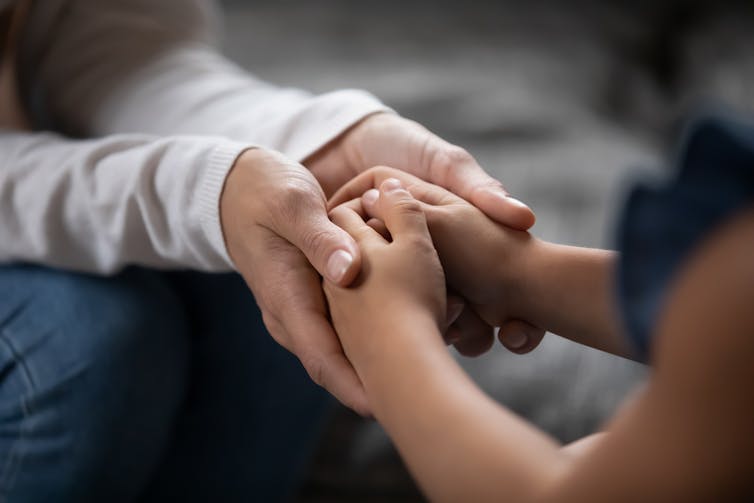“Kids are resilient.” You have heard this before, right? You might have even said it, with the best of intentions.
Resilience sometimes seems like a buzzword and is used in ill-defined ways. If adults praise children’s resilience without addressing their needs, this leaves children vulnerable to harm.
Resilience doesn’t mean being unaffected by adversity — it means having the tools, relationships and supports to cope with it.
Part of my role as a child development specialist with expertise in therapeutic play, as well childhood loss and grief, is consulting work with families and educators. I see children acting out in classrooms, withdrawing at home or having difficulties processing and regulating emotions and behaviours. Finding the right supports for a child often means many things.
Offering children the environments and relationships that build resilience includes:
Adequate social infrastructure and resourcing to ensure families can meet basic needs in dignified ways (for example, they can access nutritious food and safe and sustainable housing);
Parent communities and support groups so parents aren’t expected to parent in isolation;
Parents and caregivers who have access to mental health support;
Emotionally safe classrooms that focus on supports for the whole child, not just academically rigorous ones.
In the everyday, children need adults who are well enough to care for them and present enough to notice their struggles.
Many families with deep needs
The 2024 National Report Card on Child and Family Poverty from Campaign 2000, a network of organizations committed to ending child and family poverty in Canada, reveals that in 2022, nearly one in five children were growing up in poverty.
The child poverty rate rose by two and a half percentage points from the previous year, representing the largest annual increase in child poverty on record. Lone-parent households, most of them led by women, are disproportionately affected, with one in five relying on social assistance.
As financial insecurity deepens and government supports like the Canada Child Benefit lose their effectiveness due to high costs of living, parents are under formidable financial pressure that impacts their parenting capacity and personal wellness.
Mental health gaps
Mental Health Research Canada’s 2023 report, Exploring the Mental Health Landscape of Canadian Parents, reveals that younger parents, especially those under 30, are facing self-reported elevated levels of anxiety and depression since the end of the COVID-19 pandemic.
The data also suggests that parents of children under two years of age are more likely to receive a new mental health diagnosis, likely due to decreased contact with health-care providers during the pandemic.
What happens when parents are overwhelmed? Children feel it, and they need support to bounce back from it.
The pressures parents face are not isolated. In a 2025 study on the perceptions of kindergarten, Grade 1 and Grade 2 educators in Ontario regarding their students’ developmental and academic skills and their own mental health during the 2021 to 2022 school year, teachers reported increased anxiety and slower developmental progress in children.
Read more: From full-day learning to 30 minutes daily: The effects of school closures on kindergarteners
Healthy development can’t be taken for granted
If we only skim headlines that children displayed resilient capacities during the pandemic without looking deeper at how the pandemic also impeded healthy development, we are missing the full picture.
It is only through longitudinal study — examining how kids are doing across time — that we’ll be able to fully understand impacts. For example, data from the Canadian Health Survey on Children and Youth shows about one in five youth who felt their mental health was good in 2019 no longer felt that way four years later.
Read more: Pandemic babies’ developmental milestones: Not as bad as we feared, but not as good as before
The 2023 Raising Canada Report, based on research conducted by researchers at the University of Calgary and McGill University and published by the non-profit organization Children First Canada, reports on violence, poverty, mental health struggles and online sexual exploitation affecting Canadian children.
The report reveals there were 40 child homicides in 2022, and rates of hospital visits for self-harm and suicide attempts among youth have doubled over the past decade.
These alarming reports suggest many families and children are struggling, lacking the resources they need to process their experiences and heal.
Building your child’s and your own resilience
Parental burnout is real — and compassion for oneself is the first step in supporting children.

Here are a few strategies parents can try to use, even when worn down:
Focus on connection. A few minutes of undistracted time with your child — reading a book, going for a walk or simply talking without a phone nearby — builds connection and safety. When children feel a sense of safety and connection with their parent, they are more likely to share their thoughts and emotions. When children feel safe enough to verbalize their emotions, they are more inclined to process challenging times.
Name and normalize emotions. Help your child build emotional vocabulary by labelling feelings for them in your day-to-day interactions. Saying things like “I noticed you looked frustrated when your Lego broke. That’s OK. It’s hard when things don’t go as planned” helps children to learn how to identify and name their emotions which is the first step in taming emotions.
Model self-regulation, and when you feel overwhelmed, label your feelings. Try saying, “I’m feeling really worried right now, so I’m going to take a few deep breaths.” This teaches children that big feelings are a normal human experience. It also models for children healthy coping strategies.
Ask for help and accept support. Parenting shouldn’t be done alone. Ask for help. Find a community of like-minded parents who can talk through big and small moments with you. Let your child see that it’s OK to ask for help — this is how you build resilience.
Elena Merenda does not work for, consult, own shares in or receive funding from any company or organisation that would benefit from this article, and has disclosed no relevant affiliations beyond their academic appointment.
This article was originally published on The Conversation. Read the original article.







